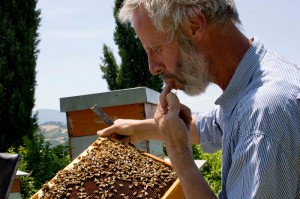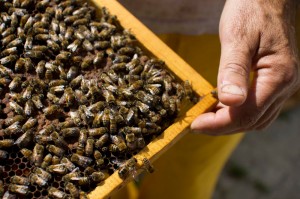Viruses, pesticides and pollution combine to endanger bees world-wide, though some Italian beekeepers are feeling a small buzz of hope.
URBINO, Italy — The bees rush madly, crawling, buzzing among the boxes of faded orange, red, yellow and green stacked spottily in the rolling hills outside this Renaissance city. Fabrizio Pesare dons fluorescent yellow pants, omitting the usual beekeeper’s suit and netted mask, daring to remove the hive’s frames of pale, yellow wax brimming with his bees, unprotected from their stings.
Pesare prods with youthful but knowing hands, sweeping away a portion of the wax, pressing down for an ooze of honey that catches the sun with crystal-like reflection as the bees scatter from their sweet creation.

Pesare, a wide-eyed 35-year-old native of Urbino with a coy smile surrounded by a three-day stubble, has been keeping bees for five years at Apicoltura Gabannini. He is a fourth generation beekeeper at this family business five kilometers from the city.
Beekeeping is his passion, but that passion is under constant threat. The global honeybee population has suffered years of population loss—up to 40 percent in Italy, alone—and the fear of honeybee extinction is tragically alive and well.
Pesare has lost 40 to 45 percent of his bees, more bees this year than last. In 2011, he lost 7 million bees. But in 2012, he has lost an ominous 12 million bees.
The death of the honeybee has been blamed on multiple causes, afflicting thousands of beekeepers, raising honey prices, and prompting an examination of humankind’s treatment of the environment.
The bees began disappearing from the Northern hemisphere in the 1980s in a phenomenon known as colony collapse disorder (CCD), in which worker bees from a beehive or European honeybee colony abruptly disappeared, according to Gherardo Bogo, researcher at the Council for Research and Experimentation in Apicolture (beekeeping) in Bologna, Italy. Parasites, viruses, and pesticides are wreaking havoc on the bees.
[pullquote]Why do some of these farmers who should be even more aware of the environment give poisonous pesticides to their plants, causing the death of the bees, and then damages for the environment, itself?[/pullquote]
“Here we come to the real paradox of the whole situation,” Pesare said through an interpreter. “The beekeeper takes care of the bees, which in turn take care of the environment. Why do some of these farmers who should be even more aware of the environment give poisonous pesticides to their plants, causing the death of the bees, and then damages for the environment, itself?”
The honeybee faces a danger that comes in a much smaller form than itself–the Varroa. This parasitic mite feeds off of the bodily fluids of the bee and transmits various viruses, Bogo said.
The threat of the vampire-like Varroa joins pesticides, another deadly danger to the honeybee that has struck Apicoltura Gabannini. Pesare estimated he lost 4 million of his bees last year from pesticides used by a neighboring farmer.
Dressing seed corn was one such pesticide. It was used on seeds, and the use is now suspended in Italy. After this suspension in 2008, the drastic death of the bees slowed, according to Bogo. But other pesticides are still all-too-commonly used.

The Pesare family began beekeeping well before such pesticides. Marino Gabannini, Pesare’s great-grandfather, began Apicoltura Gabannini after collecting one honeybee in a jar, and deciding his life would be dedicated to the bees and honey production. Pesare has followed suit.
“When I put my hands in the bees, I am happy,” Pesare said.
But that happiness is in danger.
“All of the beekeepers reported loss,” said Floriana Ferri of Consorzio Apistico Provinciale, a beekeepers association for the Urbino-Pesaro region based in Pesaro.
There are 490 members. Each reported, on average, a 50 percent loss of bees in 2011 and a 30 percent loss in 2012.
But some see signs of hope. Beekeeper Roberto Podgornik cares for his bees deep in the hills of Urbino, at his and his wife’s farm, La Fattoria Dei Cantori, where his neighbors are a distant blur on the hillsides. The farm is an agri-tourismo, where people can stay and help bake bread, and do other chores.
After years of population loss, all of Podgornik’s bees survived this year. La Fattoria Dei Cantori calls itself an organic, or biologic, farm. Organic beekeeping involves maintaining bees far from roads, pollution, and industry; chemical products must never be used, Podgornik said.
A gray-haired farmer with a face lined both with deep wrinkles and contentment, Podgornik developed a new method of beekeeping to prevent the death of his bees.
He worked around the deadly technique of the Varroa to keep all of his bees alive this year without the use of chemicals by isolating the queen bees to protect them from the virus. It seems to be working. Beekeepers in the Urbino-Pesaro region who used natural procedures this year have lost fewer bees than those who used chemical treatments, according to Mario Ciaboti, president of Consorzio Apistico Provinciale.
The possibility of a future without bees weighs heavily as the threats of the Varroa virus and pesticides loom, along with the activities of humans.
“Bees are the best environmental sentinels; if they die, there is a big problem,” Bogo said. “The environment is signaling that there are major problems, and that humans should begin to preserve more. Pollution, pesticides, global warming are all factors that underline a big problem.”
And of course, bees produce sweet, syrupy honey. Apicoltura Gabannini has raised the prices of its honey at a medium rate in comparison to larger stores, according to Pesare. This amounts to an increase of one euro (about $1.25) per kilo of honey over the last five years to a current total wholesale price of about 13 euro per kilo.
“The cost has gone up, but not proportional to our losses,” Pesare said. “If we raised the prices proportional to our losses the costs would be to the stars.”
The decline hangs over not only beekeepers, but all of humanity.
“We are in a situation in which all that is left for us to do is to die out if we are not aware,” Pesare said. “They [the bees] give us no alternative.”
Multimedia